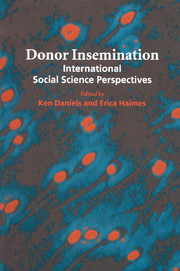Book contents
- Frontmatter
- Contents
- List of figures
- List of tables
- Notes on contributors
- Acknowledgements
- List of abbreviations
- 1 International social science perspectives on donor insemination: an introduction
- 2 The users of donor insemination
- 3 Families created through donor insemination
- 4 The making of ‘the DI child’: changing representations of people conceived through donor insemination
- 5 The semen providers
- 6 The medical management of donor insemination
- 7 Regulation of donor insemination
- 8 Donor insemination and ‘public opinion’
- 9 Concluding comments
- Index
8 - Donor insemination and ‘public opinion’
Published online by Cambridge University Press: 04 August 2010
- Frontmatter
- Contents
- List of figures
- List of tables
- Notes on contributors
- Acknowledgements
- List of abbreviations
- 1 International social science perspectives on donor insemination: an introduction
- 2 The users of donor insemination
- 3 Families created through donor insemination
- 4 The making of ‘the DI child’: changing representations of people conceived through donor insemination
- 5 The semen providers
- 6 The medical management of donor insemination
- 7 Regulation of donor insemination
- 8 Donor insemination and ‘public opinion’
- 9 Concluding comments
- Index
Summary
An anthropological perspective
Developments and innovations in assisted conception have raised questions that go beyond the practical and pragmatic application of the techniques themselves. In Britain, for example, attention has focused on, amongst other things, whether or not women should be allowed to donate ova to their sisters, whether maternal surrogacy arrangements should be allowed, or, in the case of DI whether sperm providers should be, and remain, anonymous. From a social anthropological perspective, such concerns reveal a culture's understanding of the way in which significant social relationships are created and maintained. Stories about conception and the ways in which people perceive themselves to be related, as well as the forms that such relationships take, come under the rubric of kinship; and the demarcation of kinship and its study has been central in the development of social anthropology.
This chapter draws on anthropological research in a town in the north of England, which for present purposes I call Alltown. I returned to Alltown, a place where I had previously carried out residential fieldwork, in order to investigate residents' ideas about new reproductive technologies. In the process of this research, I was constantly ‘passed on’ to residents who were perceived to have different kinds of knowledge about creating and maintaining family relationships. Hence, women said I ought to speak to men, or to other women who were perhaps younger or older, or to other women who had smaller or larger families – to people, in other words, who were perceived to have a different experience of kinship.
- Type
- Chapter
- Information
- Donor InseminationInternational Social Science Perspectives, pp. 151 - 172Publisher: Cambridge University PressPrint publication year: 1998
- 8
- Cited by



